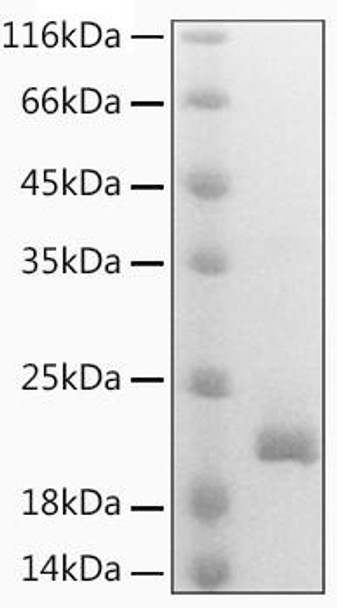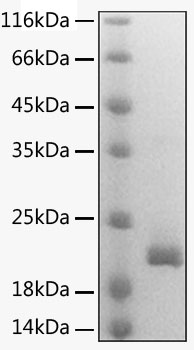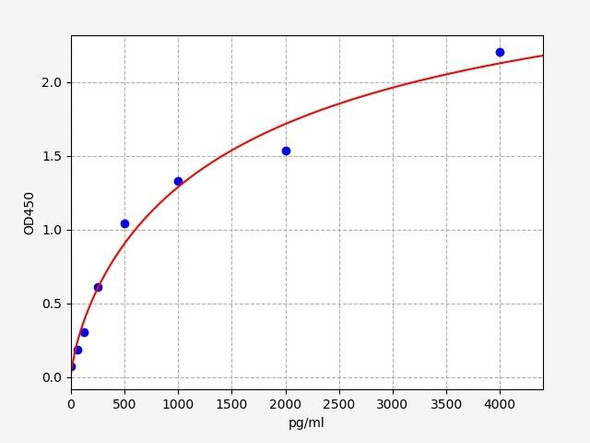Description
Recombinant Mouse Lymphotactin/XCL1 Protein
The Recombinant Mouse Lymphotactin/XCL1 Protein is a high-quality recombinant protein designed for murine biological research applications. This protein serves as an essential reagent in mouse model studies, comparative immunology research, and preclinical therapeutic evaluations, enabling scientists to investigate Lymphotactin/XCL1 biology and its relevance to human disease mechanisms through translational research approaches.
This product (SKU: RPCB2126) is produced using Baculovirus-Insect Cells and features a C-His tag for convenient detection and purification. The protein exhibits a calculated molecular weight of 11.5 kDa with an observed molecular weight of 20 kDa under denaturing conditions, achieving ≥ 85 % as determined by SDS-PAGE., ensuring exceptional quality and consistency for research applications.
Key Features
| High Purity by Affinity Chromatography | |
| Mammalian & Bacterial Expression Systems | |
| High lot-to-lot consistency via strict QC |
| Product Name: | Recombinant Mouse Lymphotactin/XCL1 Protein |
| SKU: | RPCB2126 |
| Size: | 50 μg |
| Reactivity: | Mouse |
| Synonyms: | LTN, ATAC, LPTN, SCM1, SCM-1, SCM1A, SCYC1, SCM-1a |
| Tag: | C-His |
| Expression Host: | Baculovirus-Insect Cells |
| Calculated MW: | 11.5 kDa |
| Observed MW: | 20 kDa |
| Gene ID: | 16963 |
| Protein Description: | High quality, high purity and low endotoxin recombinant Recombinant Mouse Lymphotactin/XCL1 Protein (RPCB2126), tested reactivity in Baculovirus-Insect Cells and has been validated in SDS-PAGE.100% guaranteed. |
| Endotoxin: | < 1 EU/μg of the protein by LAL method. |
| Purity: | ≥ 85 % as determined by SDS-PAGE. |
| Formulation: | Lyophilized from sterile 50mM Tris, 100mM NaCl, pH 7.4, 10% gly |
| Reconstitution: | Centrifuge the vial before opening. Reconstitute to a concentration of 0.1-0.5 mg/mL in sterile distilled water. Avoid vortex or vigorously pipetting the protein. For long term storage, it is recommended to add a carrier protein or stablizer (e.g. 0.1% BSA, 5% HSA, 10% FBS or 5% Trehalose), and aliquot the reconstituted protein solution to minimize free-thaw cycles. |
| Storage: | Store at -20℃.Store the lyophilized protein at -20℃ to -80 ℃ up to 1 year from the date of receipt. After reconstitution, the protein solution is stable at -20℃ for 3 months, at 2-8℃ for up to 1 week. |
This antimicrobial gene encodes a member of the chemokine superfamily. Chemokines function in inflammatory and immunological responses, inducing leukocyte migration and activation. The encoded protein is a member of the C-chemokine subfamily, retaining only two of four cysteines conserved in other chemokines, and is thought to be specifically chemotactic for T cells. This gene and a closely related family member are located on the long arm of chromosome 1.







